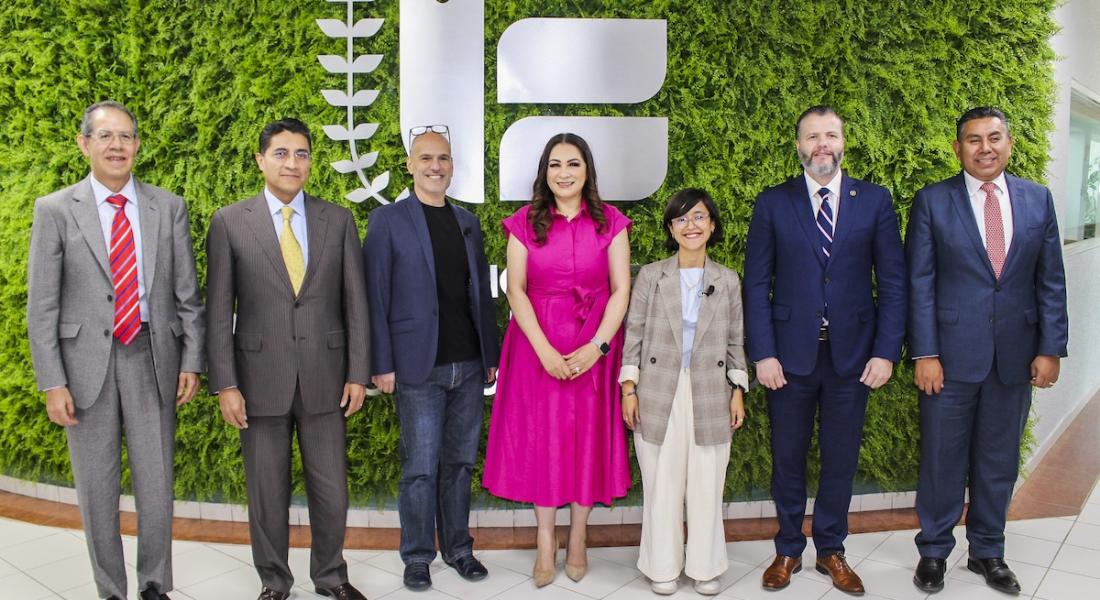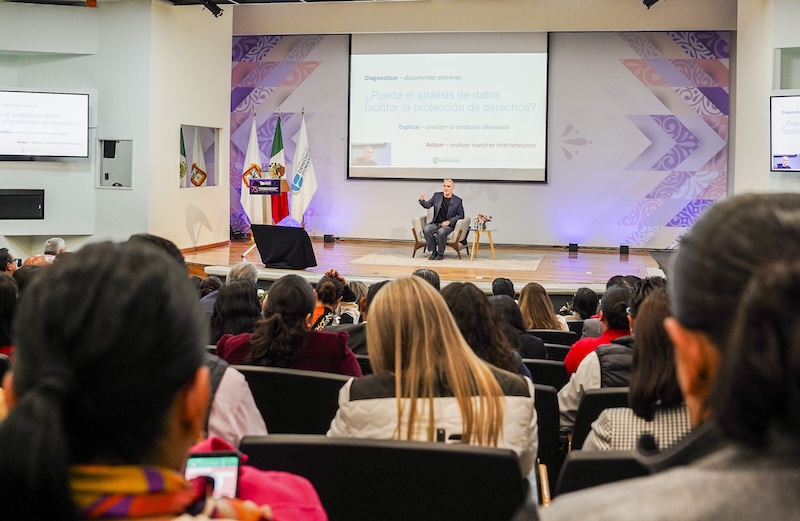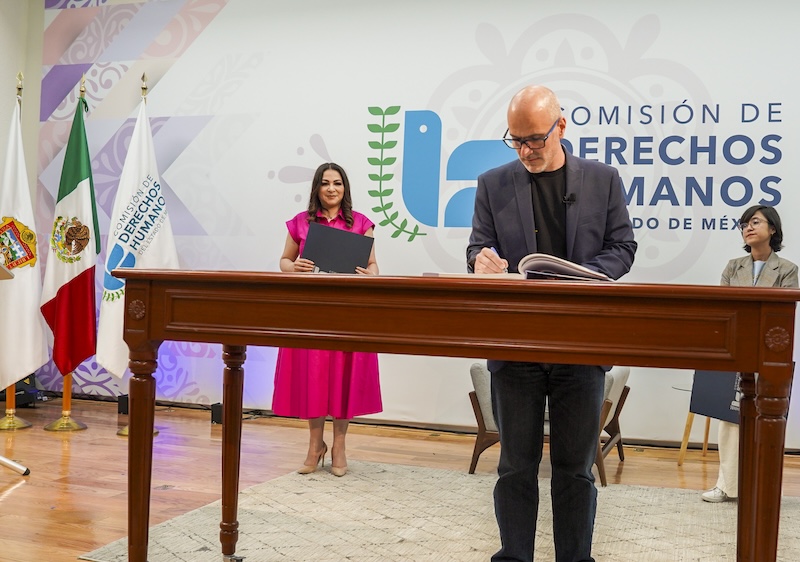
How do we measure the fulfillment of human rights across a state, a country, a region, the world?
This is a pressing and fundamental question that Kellogg’s Notre Dame Reparations Design and Compliance Policy and Practice Lab endeavors to answer. In one effort, they are working in partnership with The Commission of Human Rights of the State of Mexico (CODHEM) to develop an accounting of how human rights are being respected across the state of Mexico.
“We are developing the methodology to do an index combining measures of respect for human rights,” says Kellogg Institute Director Aníbal Pérez-Liñán, who is the Lab’s co-principal investigator with Kellogg faculty fellow Diane Desierto, professor of law and global affairs.
The Lab develops and tests methodologies to assess state compliance with reparative orders of international adjudication bodies, such as the Inter-American Court of Human Rights and the World Bank Inspection Panel.
Kellogg PhD Fellow and doctoral student of political science Mayra Ortiz Ocaña is working alongside Pérez-Liñán on this project with CODHEM. Her research examines the intersection of law and politics, access to justice, human rights, and violence in Latin America. Last year, she and Pérez-Liñán presented the project at an event organized by CODHEM in Toluca, the capital of the state of Mexico.
“There was a lot of interest among the people from the university, human rights NGOs, and people from the commission itself. That was very encouraging in that it showed how important the project was,” says Pérez-Liñán. “And it was also a very useful time in terms of the questions we received from the audience, which helped us calibrate the analytical challenges we would have ahead.”
 For example, there are areas in the state of Mexico that are affected by organized crime where people may not be able to submit complaints to CODHEM when their rights are violated.
For example, there are areas in the state of Mexico that are affected by organized crime where people may not be able to submit complaints to CODHEM when their rights are violated.
“That opens this interesting analytical problem from our point of view: You observe a complaint, the complaint is telling you something about the probability that the right is being violated in that particular area, which is bad, but it’s also telling you something about the probability that somebody is able to assert his or her rights by filing a complaint, which is good,” says Pérez-Liñán. “The event that we observe is a product of this mechanism that tells us very different stories that we need to disentangle in some way. This is the type of methodological problem that, from a social sciences perspective, is really challenging, and – from the point of view of offering reliable information to the human rights commission – is crucial.”
Measuring Human Rights Fulfillment and Protection
After Notre Dame and CODHEM signed a memorandum of understanding to outline how this unique partnership would work in November 2022, the first step in the project was determining what rights to measure and how. Ortiz Ocaña compared the list of rights recognized by the United Nations, the Inter-American System of Human Rights, the Mexican Constitution, and the state’s legislation to determine an exhaustive catalog of human rights. This exercise allowed her to identify what CODHEM needs to measure for this project: 23 rights, 65 specific sub-rights, and 154 concrete obligations for the government.
“Human rights have two faces, like a coin. On the one side, you have the right, but on the other side is the fulfillment of that right through state duties,” says Ortiz Ocaña. “If you have the right to water, for instance, you need someone to provide water to your house – the municipality or another institution. The first part of this study was to identify the core rights we needed to measure, and, at the same time, we needed to unpack the obligations related to those rights and know who was responsible for fulfilling those rights.”
To determine if an institution was designated to fulfill certain rights, the commission collected data on the presence of institutions in every municipality, then the Lab assessed how well these institutional arrangements are doing at fulfilling and protecting rights at the municipal level through other data collection methods.
“The Lab provides the experience in social science research and the technical skills for this investigation,” says Pérez-Liñán. “On the other hand, the Human Rights Commission is providing the fundamental research questions, their knowledge of the context, and the resources to conduct the investigation locally.”
The commission also provided data on how they receive and process human rights complaints from across the state, and the Lab classified those complaints.
Additionally, Ortiz Ocaña and Ana Maria Montoya, a human rights survey expert and director of data analytics at the World Justice Project, designed a public opinion survey. Now CODHEM is conducting the survey with thousands of representative households about their experience with and perception of human rights fulfillment. Each of these data sets are essential to understanding what is happening in the state of Mexico and why.
A Call to Action
There are many human rights issues in the state of Mexico, which is the most densely populated state in the country – not only those glaring issues that make headlines, like killings, disappearances, and torture, but also fundamental rights like having access to clean water, food, employment, and housing.
“There are issues of human rights that are pressing and urgent in the sense that they affect the basic right to life and physical integrity. Mexico is experiencing, and has experienced for many years, gross human rights violations related to the presence of organized crime and the confrontation between armed forces and security forces against organized crime,” says Pérez-Liñán. “If you think of human rights in a broader sense, in less dramatic terms, there are also issues of gender equality and gender rights, questions of poverty and access to basic living conditions.”
Once the public opinion survey is complete, the Lab and CODHEM will work together to develop a report that assesses three dimensions of human rights protection: institutional structures (based on the survey of local officials), procedures (based on the distribution of complaints across the state), and outcomes (based on the public opinion survey). This report will give CODHEM and the government a clear diagnostic of what is happening in the state – what policies and institutions are working as intended, which ones are not – and provide support for enforcing existing policies and developing new policies and pathways to improve the situation for people living there.
“We hope that this research will push the municipalities to do their job in a better way,” says Ortiz Ocaña. “This academic work can help to provide a landscape of the situation, and different actors can grab that data and use it for different justice purposes.”
Understanding, for example, in which areas certain rights are violated will allow the commission to focus efforts in those areas. It will also allow CODHEM to call the attention of local authorities to these areas so that they can do something about it.
“If you have comparative details to assess the information across the state, it is very clear who is making an effort and who is not,” says Pérez-Liñán. “Having reliable information, objective information, information that is credible, is always the first step to developing good policy, then eventually to evaluate the quality of the policies and their impact.”
The Lab essentially is creating a template for how the state of Mexico can assess human rights fulfillment and violations for many years to come, and Pérez-Liñán hopes the Lab will remain connected to the ongoing project.
“We do not expect that our presence will be necessary for CODHEM to operate this project in the future, but we’d very much like to be involved because it’s an extraordinary program and it's very interesting to us,” he says.
This kind of collaboration, which “finds a natural home at Kellogg,” says Pérez-Liñán, can also be used as a model of how Kellogg, and the Keough School of Global Affairs more broadly, can collaborate with human rights institutions outside of academia.
In another collaboration beyond the academy, Pérez-Liñán and Ortiz Ocaña are working on a paper that investigates the reparations ordering the sanction of perpetrators of human rights violations issued by the Inter-American Court of Human Rights. Other researchers within the Lab conduct work to support the Inter-American Commission on Human Rights, Climate Justice Reparations, and the International Criminal Court.
The Lab has created a public database of all decisions issued by the Inter-American Court of Human Rights and a database of national and international court rulings ordering reparations for climate change. Additionally, the Lab has developed a quantitative methodology to assess delays in compliance with reparations for human rights violations, provided an analysis of all requests made to the World Bank Inspection Panel, and conducted a study for Paraguay's Supreme Court, analyzing Paraguay's time to compliance with different reparations ordered by the Inter-American Human Rights System.
It’s all work on behalf of human rights that lies at the intersection of the Kellogg Institute’s main research foci.
“The whole issue of human rights is central for democracy because the fulfillment of human rights is a necessary condition for democracy to flourish, and a necessary condition for human development,” says Pérez-Liñán. “Without respect to human rights, true human development is not possible.”
The Kellogg Institute for International Studies, part of the Keough School of Global Affairs at the University of Notre Dame, is an interdisciplinary community of scholars and students from across the University and around the globe that promotes research, provides educational opportunities, and builds partnerships throughout the world on the themes of global democracy and integral human development.





